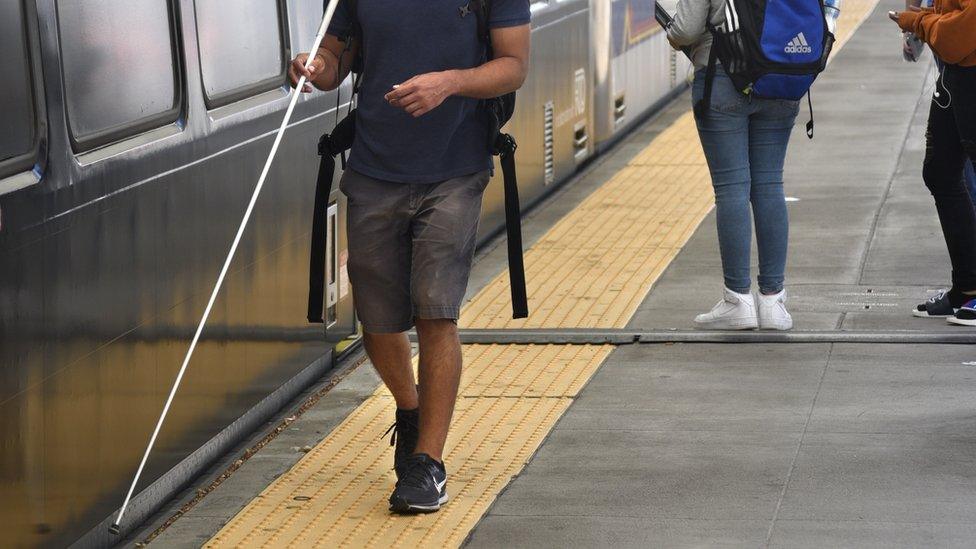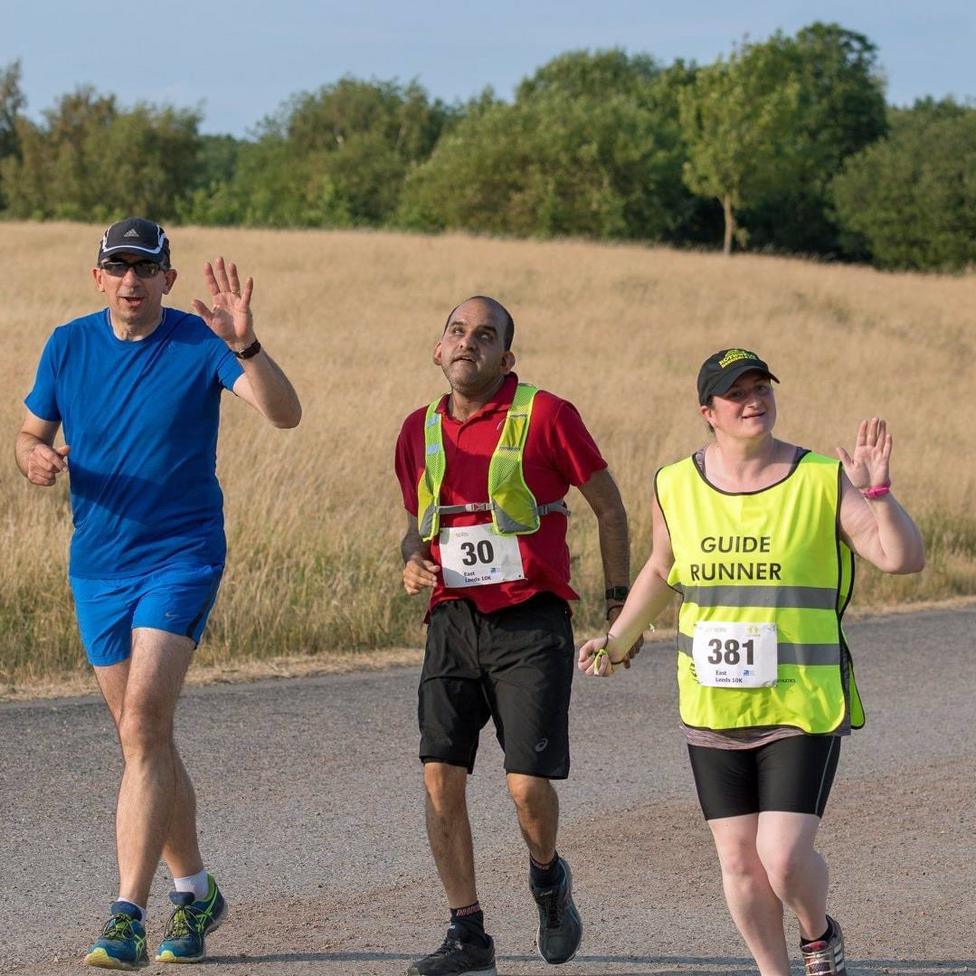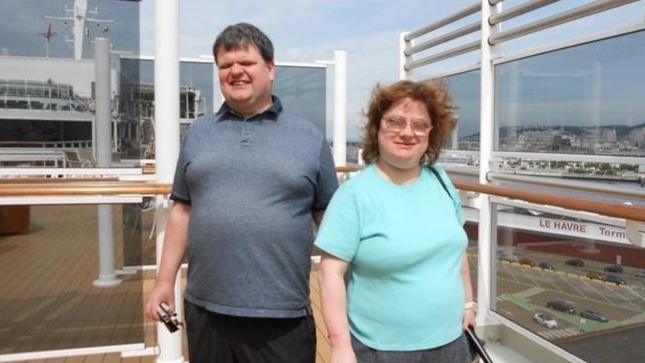Coronavirus: Being blind during the pandemic
- Published

The coronavirus pandemic has caused daily difficulties for everyone. But what if you are visually impaired? Blind journalist Kate Pounds explores the particular challenges the virus has thrown up.
As the train approached London Waterloo on my last journey home from work before lockdown, a fellow passenger remarked he didn't want to press the button to open the doors because of Coronavirus.
It got me thinking. As someone who cannot see, I have to touch objects and surfaces much more than your average person.
Just at the station I have to feel around the ticket machine to find the card reader, touch the escalator's moving handrail to see if it's going to take me up or down, and touch the side of the train doorway to gauge the width of the gap I'm so often reminded to "mind".
Added to these obvious hygiene problems, it's also harder to find a bathroom or alcohol gel point when you want to wash your hands.
So how are other visually impaired people adapting?

Sajid Ali has found going shopping more challenging recently
Sajid Ali, a 40-year-old market researcher from West Yorkshire, says a trip to the supermarket is difficult - holding a week's shop in one hand and a white cane in the other makes navigating a challenge.
He says he can lose balance and that it's hard to walk in a straight line.
He says he usually asks for help to find the items he needs, but getting that vital assistance has proved challenging recently.
"They said they were not sure they could help because of 'current things going on,'" he says. "I guess it was a contact thing, because of having to take someone's arm for guiding. I waited around for over five minutes, and in the end they did help."
Just getting to the shops is a challenge for Reanna Parkinson, 22, from Lancashire.

Reanna values her independence
"There are a lot of main roads around here and hardly any crossings so I can't get to other shops safely on my own," she says.
Her dad gave her a lift last time but she feels this threatens the safety of her mum, who is classed as high risk and needs to shield for 12 weeks.
Reanna, a graduate in criminology and sociology, values her independence but says she now may have to move in with her parents to survive.
"Normally I get a delivery, but all the slots have been taken," she says. "Some online services say they have prioritised people with disabilities for delivery slots. I've seen a lot of tweets from blind people asking how they get these priority deliveries but I haven't seen any responses."
But even if you manage to get a slot, shopping online is no picnic. For blind and visually impaired people, the process involves many more steps and is far slower, which matters when everyone is rushing to buy.
Allow X content?
This article contains content provided by X. We ask for your permission before anything is loaded, as they may be using cookies and other technologies. You may want to read X’s cookie policy, external and privacy policy, external before accepting. To view this content choose ‘accept and continue’.

Allow X content?
This article contains content provided by X. We ask for your permission before anything is loaded, as they may be using cookies and other technologies. You may want to read X’s cookie policy, external and privacy policy, external before accepting. To view this content choose ‘accept and continue’.

Sajid says by the time he had listened to the electronic voice of his screen reader, which tells him what's available, other shoppers had already bought the items he needed.
"I'm worried everything will be out of stock by the time I've even looked," he says.

Mandy O'Malley has to be careful what food she buys for her family
Another issue with online shopping occurs when items are sold out and substituted, which can be a far bigger problem for some people with multiple impairments.
Hampshire mum-of-three, Mandy O'Malley, 42, has allergies, diabetes and children with particular dietary needs, so if the delivery people arrive with items she has not researched, she has to turn them away.
"In our delivery yesterday we had seven items unavailable and 14 substitutions," she says.
Despite needing them, she had to decline the items because she couldn't read the packaging, and social distancing meant the driver couldn't help.
She isn't alone here. In 2017, the RNIB reported that the employment rate among visually impaired people was around 25%, compared to 81% for the UK generally, putting them among the poorest in society.
The charity also reported higher rates of isolation and subsequent depression among sight-impaired people in normal times.
Sajid, who usually enjoys taking part in his local Parkrun at the weekend, is concerned that a lack of contact with people will get worse during the current crisis.
"I think there will be some lonely days ahead. Usually I work and go out, but I still spend a lot of time alone, I am used to it, but with all the restrictions I could get really isolated."

Sajid says he misses going running
Despite these difficulties, many of the sight-impaired people I spoke to reported they were managing well. Some feel the complications of coronavirus are the same for them as for sighted people.
And Sajid thinks visually impaired people's strategies and resilience may sometimes put them at an advantage in tough times.
"There's always a lot to concentrate on for visually impaired people, it's ten times harder," he says. "You've got to keep your sense of humour.
"We face this kind of stuff every day so we probably have more of that humour in the locker."

A SIMPLE GUIDE: What are the symptoms?
LOOK-UP TOOL: Check cases in your area
MAPS AND CHARTS: Visual guide to the outbreak

For more Disability News, follow on Twitter, external and Facebook, and subscribe to the podcast.

- Published1 April 2020
